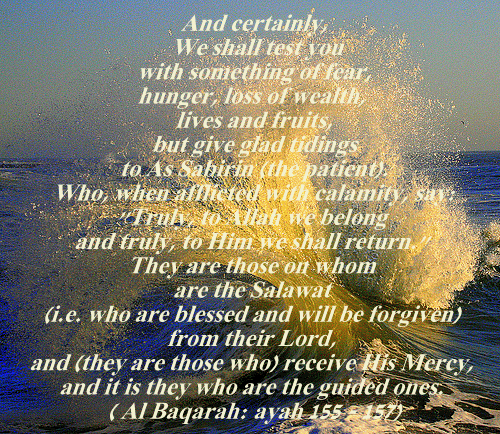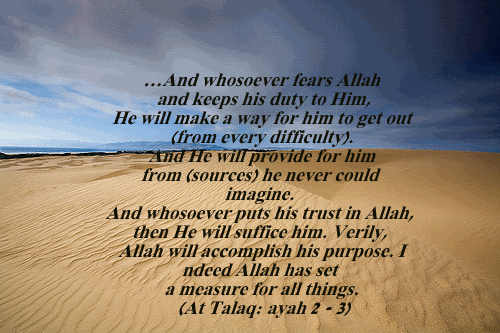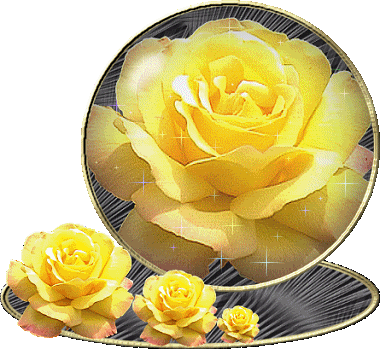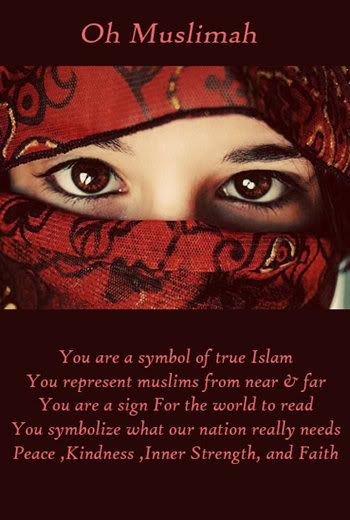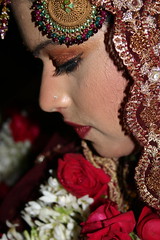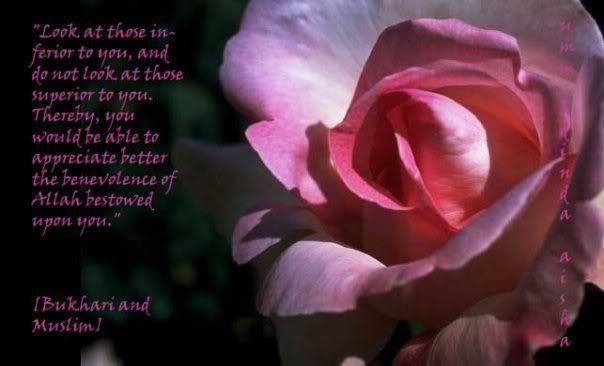 Marriage in Islam
Marriage in Islam
Excerpt from the Book " The Ideal Muslimah".
In Islam, marriage is a blessed contract between a man and a woman, in which each becomes
"permitted" to the other, and they begin the long journey of life in a spirit of love, co-operation,
harmony and tolerance, where each feels at ease with the other, and finds tranquillity,
contentment and comfort in the company of the other. The Qur'an has described this relationship
between men and women, which brings love, harmony, trust and compassion, in the most moving
and eloquent terms:
( And among His Signs is this, that He created for you mates from among
yourselves, that you may dwell in tranquillity with them, and He has put love and
mercy between your [hearts] . . .) (Qur'an 30:21)
This is the strongest of bonds, in which Allah (SWT) unites the two Muslim partners, who come
together on the basis of love, understanding, co-operation and mutual advice, and establish a
Muslim family in which children will live and grow up, and they will develop the good character and
behaviour taught by Islam. The Muslim family is the strongest component of a Muslim society when
its members are productive and constructive, helping and encouraging one another to be good and
righteous, and competing with one another in good works.
The righteous woman is the pillar, cornerstone and foundation of the Muslim family. She is seen as
the greatest joy in a man's life, as the Prophet (PBUH) said:
"This world is just temporary conveniences, and the best comfort in this world is a righteous
women."1
A righteous woman is the greatest blessing that Allah (SWT) can give to a man, for with her he can
find comfort and rest after the exhausting struggle of earning a living. With his wife, he can find
incomparable tranquillity and pleasure.
How can a woman be the best comfort in this world? How can she be a successful woman, true to
her own femininity, and honoured and loved? This is what will be explained in the following pages:
She chooses a good husband
One of the ways in which Islam has honoured woman is by giving her the right to choose her
husband. Her parents have no right to force her to marry someone she dislikes. The Muslim woman
knows this right, but she does not reject the advice and guidance of her parents when a potential
suitor comes along, because they have her best interests at heart, and they have more experience
of life and people. At the same time, she does not forego this right because of her father's wishes
that may make him force his daughter into a marriage with someone she dislikes.
There are many texts that support the woman in this sensitive issue, for example the report quoted
by Imam Bukhari from al-Khansa' bint Khidam:
"My father married me to his nephew, and I did not like this match, so I complained to the
Messenger of Allah (PBUH). He said to me: `Accept what your father has arranged.' I said, `I
do not wish to accept what my father has arranged.' He said, `Then this marriage is invalid,
go and marry whomever you wish.' I said, `I have accepted what my father has arranged,
but I wanted women to know that fathers have no right in their daughter's matters (i.e. they
have no right to force a marriage on them).'"2
At first, the Prophet (PBUH) told al-Khansa' to obey her father, and this is as it should be, because
the concern of fathers for their daughters' well-being is well-known. But when he realized that her
father wanted to force her into a marriage she did not want, he gave her the freedom to choose,
and saved her from the oppression of a father who wanted to force her into an unwanted marriage.
Islam does not want to impose an unbearable burden on women by forcing them to marry a man
they dislike, because it wants marriages to be successful, based on compatibility between the
partners; there should be common ground between them in terms of physical looks, attitudes,
habits, inclinations and aspirations. If something goes wrong, and the woman feels that she cannot
love her husband sincerely, and fears that she may commit the sin of disobeying and opposing this
husband whom she does not love, then she may ask for a divorce. This is confirmed by the report
in which the wife of Thabit ibn Qays ibn Shammas, Jamilah the sister of `Abdullah ibn Ubayy, came
to the Prophet (PBUH) and said: "O Messenger of Allah, I have nothing against Thabit ibn Qays as
regards his religion or his behaviour, but I hate to commit any act of kufr when I am a Muslim. The
Prophet (PBUH) said: "Will you give his garden back to him?" - her mahr had been a garden. She
said, "Yes." So the Messenger of Allah sent word to him: "Take back your garden, and give her one
pronouncement of divorce."3
According to a report given by Bukhari from Ibn `Abbas, she said, "I do not blame Thabit for
anything with regard to his religion or his behaviour, but I do not like him."
Islam has protected woman's pride and humanity, and has respected her wishes with regard to the
choice of a husband with whom she will spend the rest of her life. It is not acceptable for anyone,
no matter who he is, to force a woman into a marriage with a man she does not like.
There is no clearer indication of this than the story of Barirah, an Ethiopian slave-girl who belonged
to `Utbah ibn Abu Lahab, who forced her to marry another slave whose name was Mughith. She
would never have accepted him as a husband if she had been in control of her own affairs. `A'ishah
(May Allah be pleased with her) took pity on her, so she bought her and set her free. Then this
young woman felt that she was free and in control of her own affairs, and that she could take a
decision about her marriage. She asked her husband for a divorce. Her husband used to follow her,
weeping, whilst she rejected him. Bukhari quotes Ibn `Abbas describing this freed woman who
insisted on the annulment of her marriage to someone she did not love; the big-hearted Prophet
(PBUH) commented on this moving sight, and sought to intervene.
Ibn `Abbas said:
"Barirah's husband was a slave, who was known as Mughith. I can almost see him, running
after her and crying, with tears running down onto his beard. The Prophet (PBUH) said to
`Abbas, `O `Abbas, do you not find it strange, how much Mugith loves Barirah, and how
much Barirah hates Mughith?' The Prophet (PBUH) said (to Barirah), `Why do you not go
back to him?' She said, `O Messenger of Allah, are you commanding me to do so?' He said,
`I am merely trying to intervene on his behalf.' She said, `I have no need of him.'"4
The Prophet (PBUH) was deeply moved by this display of human emotion: deep and overwhelming
love on the part of the husband, and equally powerful hatred on the part of the wife. He could not
help but remind the wife, and ask her why she did not go back to him, as he was her husband and
the father of her child. This believing woman asked him, whether he was ordering her to do so:
was this a command, a binding obligation? The Prophet (PBUH), this great law-giver and educator,
replied that he was merely trying to intercede and bring about reconciliation if possible; he was not
trying to force anybody to do something they did not wish to.
Let those stubborn, hard-hearted fathers who oppress their own daughters listen to the teaching of
the Prophet (PBUH)!
The Muslim woman who understands the teachings of her religion has wise and correct standards
when it comes to choosing a husband. She does not concern herself just with good looks, high
status, a luxurious lifestyle or any of the other things that usually attract women. She looks into his
level of religious commitment and his attitude and behaviour, because these are the pillars of a
successful marriage, and the best features of a husband. Islamic teaching indicates the importance
of these qualities in a potential husband, as Islam obliges a woman to accept the proposal of
anyone who has these qualities, lest fitnah and corruption become widespread in society:
"If there comes to you one with whose religion and attitude you are satisfied, then give your
daughter to him in marriage, for if you do not do so, fitnah anmischief will become
widespread on earth."5
Just as the true Muslim young man will not be attracted to the pretty girls who have grown up in a
bad environment, so the Muslim young woman who is guided by her religion will not be attracted to
stupid "play-boy" types, no matter how handsome they may be. Rather she will be attracted to the
serious, educated, believing man who is clean-living and pure of heart, whose behaviour is good
and whose understanding of religion is sound. No-one is a suitable partner for the good, believing
woman except a good, believing man; and no-one is a suitable partner for the wayward, immoral
woman but a wayward, immoral man, as Allah (SWT) has said:
( Women impure are for men impure, and men impure for women impure, and
women of purity are for men of purity, and men of purity are for women
of purity . ..) (Qur'an 24:26)
This does not mean that the Muslim woman should completely ignore the matter of physical
appearance, and put up with unattractiveness or ugliness. It is her right - as stated above - to
marry a man for whom her heart may be filled with love, and who is pleasing to her both in his
appearance and in his conduct. Appearance should not be neglected at the expense of inner
nature, or vice versa. A woman should choose a man who is attractive to her in all aspects, one
who will gain her admiration and respect. The true Muslim woman is never dazzled by outward
appearances, and she never lets them distract her from seeing the essence of a potential spouse.
The Muslim woman knows that the man has the right of qiwamah over her, as the Qur'an says:
( Men are the protectors and maintainers [qawwamun] of women, because Allah
has given the one more [strength] than the other, and because they support them
from their means . . .) (Qur'an 4:34)
Hence she wants to marry a man of whose qiwamah over her she will feel proud, one whom she
will be happy to marry and never regret it. She wants a man who will take her hand in his and set
out to fulfil their life's mission of establishing a Muslim family and raising a new generation of
intelligent and caring children, in an atmosphere of love and harmony, which will not be impeded
by conflicting attitudes or religious differences. Believing men and believing women are supposed
to walk side-by-side on the journey of life, which is a serious matter for the believer, so that they
may fulfil the great mission with which Allah (SWT) has entrusted mankind, men and women alike,
as the Qur'an says:
( For Muslim men and women - for believing men and women, for devout men and
women, for true men and women, for men and women who are constant and
patient, for men and women who humble themselves, for men and women who give
in charity, for men and women who fast [and deny themselves], for men and
women who guard their chastity, and for men and women who engage much in
Allah's praise - for them has Allah prepared forgiveness and great reward.) (Qur'an
33:35)
In order to achieve this great goal of strengthening the marriage bond, and establishing a stable
family life, it is essential to choose the right partner in the first place.
Among the great Muslim women who are known for their strength of character, lofty aspirations
and far-sightedness in their choice of a husband is Umm Sulaym bint Milhan, who was one of the
first Ansar women to embrace Islam. She was married to Malik ibn Nadar, and bore him a son,
Anas. When she embraced Islam, her husband Malik was angry with her, and left her, but she
persisted in her Islam. Shortly afterwards, she heard the news of his death, and she was still in the
flower of her youth. She bore it all with the hope of reward, for the sake of Allah (SWT), and
devoted herself to taking care of her ten-year-old son Anas. She took him to the Prophet (PBUH),
so that he could serve him (and learn from him).
One of the best young men of Madinah, one of the best-looking, richest and strongest, came to
seek her hand in marriage. This was Abu Talhah - before he became Muslim. Many of the young
women of Yathrib liked him because of his wealth, strength and youthful good looks, and he
thought that Umm Sulaym would joyfully rush to accept his offer. But to his astonishment, she told
him, "O Abu Talhah, do you not know that your god whom you worship is just a tree that grew in
the ground and was carved into shape by the slave of Banu so-and-so." He said, "Of course." She
said, "Do you not feel ashamed to prostrate yourself to a piece of wood that grew in the ground
and was carved by the slave of Banu so-and-so?" Abu Talhah was stubborn, and hinted to her of an
expensive dowry and luxurious lifestyle, but she persisted in her point of view, and told him
frankly: "O Abu Talhah, a man like you could not be turned away, but you are a disbelieving man,
and I am a Muslim woman. It is not permitted for me to marry you, but if you were to embrace
Islam, that would be my dowry (mahr), and I would ask you for nothing more."6
He returned the following day to try to tempt her with a larger dowry and more generous gift, but
she stood firm, and her persistance and maturity only enhanced her beauty in his eyes. She said to
him, "O Abu Talhah, do you not know that your god whom you worship was carved by the
carpenter slave of so-and-so? If you were to set it alight, it would burn." Her words came as a
shock to Abu Talhah, and he asked himself, Does the Lord burn? Then he uttered the words:
"Ashhadu an la ilaha ill-Allah wa ashhadu anna Muhammadan rasul-Allah."
Then Umm Sulaym said to her son Anas, with joy flooding her entire being, "O Anas, marry me to
Abu Talhah." So Anas brought witnesses and the marriage was solemnized.
Abu Talhah was so happy that he was determined to put all his wealth at Umm Sulaym's disposal,
but hers was the attitude of the selfless, proud, sincere believing woman. She told him, "O Abu
Talhah, I married you for the sake of Allah (SWT), and I will not take any other dowry." She knew
that when Abu Talhah embraced Islam, she did not only win herself a worthy husband, but she also
earned a reward from Allah (SWT) that was better than owning red camels (the most highly-prized
kind) in this world, as she had heard the Prophet (PBUH) say:
"If Allah (SWT) were to guide one person to Islam through you, it is better for you than
owning red camels."7
Such great Muslim women are examples worthy of emulation, from whom Muslim women may
learn purity of faith, strength of character, soundness of belief and wisdom in choosing a husband.


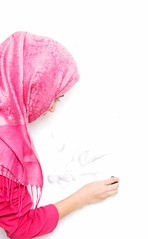

 Grapefruit
Grapefruit
 Unlike many others,calories in coconut oil act more like carbohydrates, being burned by the liver for immediate energy.
Unlike many others,calories in coconut oil act more like carbohydrates, being burned by the liver for immediate energy.


